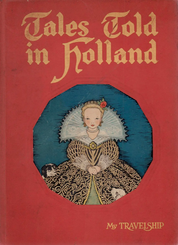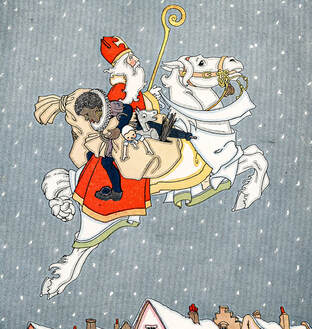A WRITER'S WIT |
My Book World

My paternal grandparents immigrated from the Netherlands over a hundred years ago. My father spoke only a little Dutch and visited Holland once. I, a nonspeaker, have been there twice. I’ve always been fascinated with the culture of this tiny country that would fit nearly two times inside the Texas Panhandle where I live, yet its rich cultural history makes it seem larger than life: Hans Brinker; or, the Silver Skates: A Story of Life in Holland is just one fine example. I’m not sure where my parents found this book, but it has been on our family shelves for a long time, I having absconded with it when my parents were no more. And until now, I’m not sure I’ve ever read it, or had it read to me. There are little crayon marks my late sister made when she was little, and it sat on her shelf. The illustrations are quaint and in that sense make it a children’s book. However, some of the tales are a bit gruesome, and some broach the blunt side of history and politics, making it a book for everyone, I should think.
One tale that has always intrigued me is “The St. Nicholas Legend,” which begins like this:
“Every winter the good old bishop, St. Nicholas, comes in his ship over the sea from Spain. And who is that with him? It is his servant, a little Moor, named Black Pete[r]. They are bringing goodies and toys for the children of Holland” (88).
Why? one must ask. For a long time St. Nicholas distributes his gifts in secret until he is discovered, then he spreads his wealth openly. This may be an oddly racist story. I say oddly because it is demeaning, the tale itself employing a racist term: “But if you want Sinterklaas to come, you must be good. And if ever you see a little black boy, be careful how you treat him. He might be Sinterklaas’s darky” (90). At the same time, the tale sets up a lesson for little white Dutch children: “These three made fun of the Moor and laughed at his black skin. Then came good Sinterklaas with an ink well, a huge one. He said, ‘Come, boys, listen here. Leave that little Moor alone. It is not his fault that he is not white like you.’” (90) When the boys do not listen to Sinterklaas, he dips them in the ink well, “black and deep” (90) to teach them a lesson. But does it? Should having black skin be portrayed as a punishment, something one can’t help?
Look, yonder comes the schooner,
All the way from Spain.
There stands good St. Nicholas,
Coming back again.
Frisking up and down the deck,
See his horsie go!
How prettily the pennants
Flutter to and fro!
His servant smiles upon us--
With gifts his bags are rich--
Who’s good, shall have some goodies,
Who’s naughty, gets a switch
NEXT FRIDAY: My Book World | TBD




 RSS Feed
RSS Feed